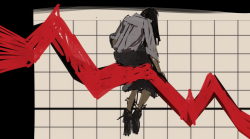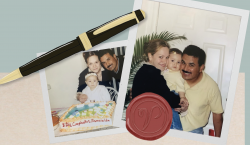It’s hard to talk on your phone in the middle of a chanting crowd, so when my mom finally answered it took me a moment to realize. “Mom,” I said in Spanish, “I’m at the rally.”
“What rally?” she asked.
“The big immigration rally in D.C.,” I told her (or rather yelled, to make myself audible) . “There are thousands of people here,” I told her, while trying to duck under someone’s giant American flag.
” Are you sure you should be there?” she asked me. “You might get in trouble.”
“No, mom,” I said in what was probably a patronizing tone, “you can’t get arrested just for attending a rally.”
In her mind, I believe, protests always inevitably lead to clashes or riots or trouble in some form. That, at least, was the experience my parents had when they were growing up in Peru in the 1970s. My dad has regaled me with stories of neararrests when he protested while in college. Though he speaks with a certain degree of pride over this, the fact is that protests, like many things in that country, were dangerous. Danger, after all, was the reason they had taken us out of the country and into the U.S. when we were too young to remember.
After I’d walked a bit I could finally hear myself think above the crowd’s chant of “Si se puede!” and called my mother again. After I’d explained that I had gone to the rally to take some pictures (not mentioning that I’d skipped a class which I had already missed several times too many to go to the march), and that I wasn’t going to get arrested, her voice hit that high pitch that tells me she’s getting emotional far too easily again.
” I’m so happy you feel some pride as an immigrant,” she told me.
“Mom, I didn’t come for the rally, I came to take pictures for The Voice,” I told her.
“Are you chanting with them,” she asked.
“No, I’m just snapping some pictures and leaving,” I told her.
When I was home for winter break, I told my parents that I was an American, and I didn’t really feel any sense of Peruvian pride. This led to an argument between us at that time, the details of which I don’t remember, except that the look on my parents’ face seemed like one of feeling betrayed. The fact is that it’s hard to feel a connection to a homeland you barely remember.
When I looked across the Mall at the people chanting, I saw people who, whether recent arrivals or not, have some sense of connection to the countries they’ve left behind. I, on the other hand, am as gringo as they get.
On the phone, my mom complained about my brother a bit; apparently he told her that illegal immigrants should be thrown out because they broke the law. If we went through the process legally, he thinks why can’t they? The odd thing is, he seems to have more of a connection to Peru than I do, and he talks a lot more about visiting. I, who bring up my immigrant status every time I rant about the need for more welcoming immigrant policies, avoid all discussions of Peru with my parents.
Snapping my photos, I felt like a tourist watching this big immigrant’s rights movement from the outside, rather than a member of it. My mom says she’s proud of me for going to the rally, showing that I stand up for my fellow people. That’s not why I went; I simply went to remind myself of where I come from.




